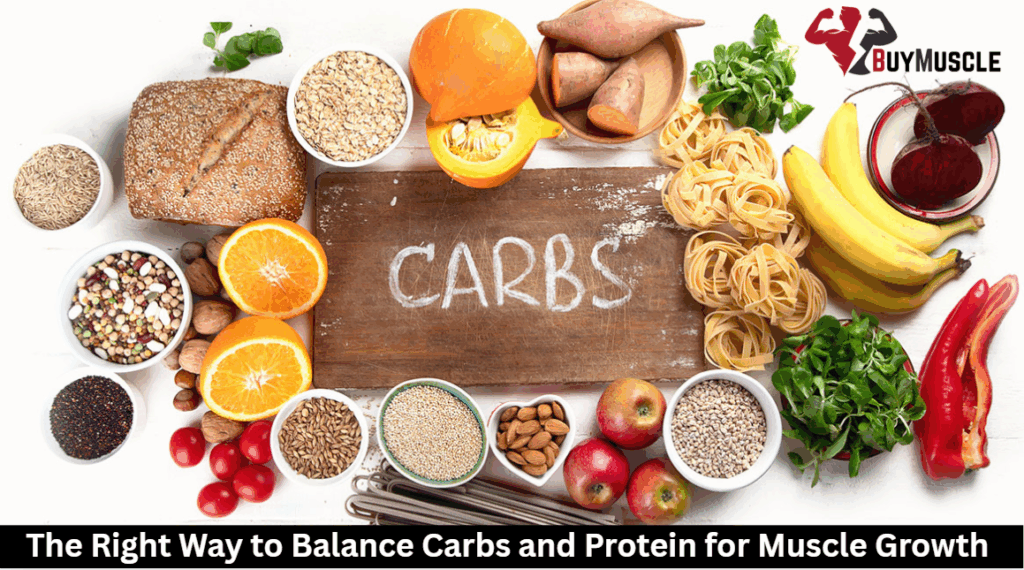After a workout, you should eat both carbs and protein within 30 to 60 minutes, with a 3:1 or 4:1 ratio of carbs to protein. Before workouts, you should eat 25 to 40 grams of carbs. On training days, you should eat more than on rest days. Depending on how active you are, change your overall macros to about 40–50% carbs, 25–30% protein, and 20–25% fats. Taking these nutrients at the right times can greatly speed up your recovery and help you build muscle.
The Science Behind Carb-to-Protein Ratios for Muscle Synthesis
A lot of people who are into fitness only think about how much protein they eat, but the best way to build muscle is to eat both protein and carbs together. When you eat enough carbs along with protein, you create a great hormonal environment for building muscle.
Carbs make insulin release, which helps move amino acids into muscle cells, which speeds up protein synthesis. After a workout, a 3:1 or 4:1 carb-to-protein ratio may be the best way to restore glycogen and speed up recovery. It doesn’t mean that protein isn’t important; it is still the main thing that helps repair damaged muscle fibers.
Timing your nutrients correctly is also important. Eating both macronutrients 30 to 60 minutes after working out takes advantage of your body’s increased sensitivity to nutrients. Your muscles are basically ready to use these nutrients in the best way possible during this time.

Timing Your Carbohydrate Intake Around Workouts
Now that we know the best carb-to-protein ratios, let’s talk about when to eat carbs to get the best results for building muscle. Strategically timing when you eat certain nutrients can have a big effect on your gains.
Eat a meal with moderate carbs 1 to 2 hours before your workout to give you energy without making your stomach hurt. Try to eat 25–40 grams of carbs and 15–25 grams of protein.
Nutrition after a workout is very important because that’s when your muscles are ready to get more glycogen. Eat protein and fast-digesting carbs within 30 to 45 minutes after working out. This mix causes insulin to be released, which moves nutrients into muscle cells and speeds up recovery.
If you work out for a long time, think about eating carbs during the workout to keep your energy up and stop your muscles from breaking down.

Calculating Your Optimal Macronutrient Balance Based on Activity Level
To figure out your ideal macronutrient balance, you first need to look at how active you really are. Your activity level directly affects how much fuel your body needs. When you lift weights a lot, you need more complex carbohydrates to keep your training going and stop your muscle protein from breaking down.
If you work out three to five times a week, try to keep your carb-to-protein ratio at 2:1. This means that about 40–50% of your calories should come from carbs, 25–30% from protein, and 20–25% from fats. If you train hard (6 or more times a week), raise your carbs to 50–60% and keep your protein at 25–30% to help your muscles heal.
Always change things up based on what works. If you’re gaining weight that you don’t want, cut back on carbs a little bit while keeping your calorie balance. It’s important to remember that your body’s needs change as you train harder, so check your macronutrient distribution every month.

Strategic Carb Cycling for Enhanced Muscle Development
Many people do well with traditional balanced macronutrient diets, but strategic carb cycling can help you build muscle even more. This method involves changing the ratio of carbohydrates to proteins on purpose throughout the week to get the best results for both muscle growth and metabolism.
On days when you work out, eat more carbs to give you energy for hard workouts and help you recover. Make sure you still get enough protein. On days when you don’t work out, cut back on carbs and keep protein high to help you lose fat without losing muscle. This manipulation makes the timing of nutrients better by giving you energy when you need it most.
On days when you eat a lot of carbs, you might notice that you have more energy during workouts. On days when you eat fewer carbs, your insulin sensitivity and fat use may improve. The most important thing is to stick to a regular cycling pattern instead of having random changes.
Putting Macro Ratios Into Practice
You need more than just theoretical knowledge of macro ratios; you need practical ways to use them in your daily life. Start by making simple meal plans that fit with your training schedule. If you’re going to be lifting heavy, try to eat three times as many carbs as proteins to give you energy and help you build lean muscle.
You could have oatmeal with whey protein and fruit for breakfast and brown rice with chicken breast and vegetables for lunch. After your workout, drink a shake with fast-digesting carbs and 25 to 30 grams of protein within 30 minutes to get the most amino acids. Cut back on carbs a little bit for dinner, but keep your protein intake the same.
When you can, make meals ahead of time and keep portable protein-carb combinations on hand for busy days. This practical approach makes it possible to time your meals instead of making them too hard.
Frequently Asked Questions
How Do Hormones Affect My Ideal Carb-Protein Ratio?
Your insulin sensitivity, cortisol levels, and testosterone/estrogen balance affect your ideal ratio. You’ll need more carbs if you’re insulin sensitive, and you might require higher protein if your anabolic hormones are lower.
Can Specific Carb Types Enhance Protein Synthesis Better Than Others?
Yes, fast-digesting carbs like white rice and dextrose spike insulin more effectively, enhancing protein transport to your muscles. You’ll maximize protein synthesis by pairing these carbs with protein after workouts.
Should Women Balance Carbs and Protein Differently Than Men?
Yes, women typically need fewer total calories but similar protein proportions as men. You’ll benefit from maintaining higher carb ratios (3:1 carb-to-protein) to support hormonal health while still getting 1.6-2g of protein per kg bodyweight.
How Does Aging Change Optimal Carb-Protein Ratios for Muscle Maintenance?
As you age, you’ll need more protein (1-1.2g per kg bodyweight) and slightly fewer carbs to maintain muscle mass. Focus on protein quality and timing while ensuring carbs still fuel your workouts effectively.
Will Intermittent Fasting Compromise My Muscle-Building Carb-Protein Balance?
Yes, it can. You’ll likely miss critical feeding windows for protein synthesis. Schedule your eating window to include pre- and post-workout nutrition, or you’ll compromise your muscle-building potential.







